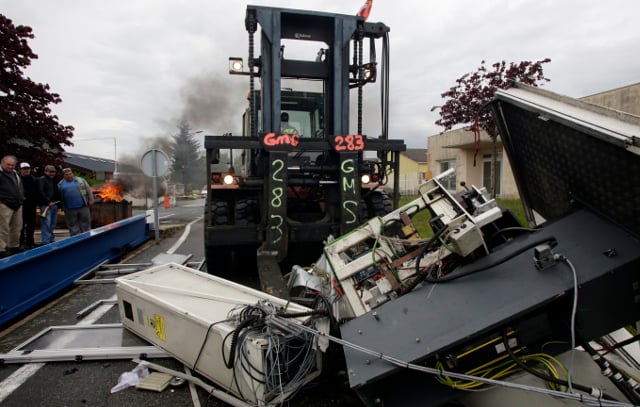The workers at GM&S auto-suppliers plant in the Creuse department of central France have sent a message to bosses and car giants Renault and Peugeot by threatening to blow up their factory.
Around 280 jobs are on the line at the plant, north of Limoges, that went into receivership in December.
According to trade union representatives the employees have started destroying their factory equipment and say they will trash a machine each day until their demands are met.
But more worrying is that they say they have booby-trapped the site with gas canisters and cans of petrol.
Images posted on Twitter showed gas canisters strung up to a huge tank of “liquid oxygen”. The words “we are going to blow everything up” (on va tout péter) were scrawled on the site of a giant liquid air tank.
#Automobile : la tension monte d'un cran chez le sous-traitant @renault_fr et @PeugeotFR #GMSIndustry https://t.co/sxjNhHtjeq pic.twitter.com/AOfa20bDkX
— France 3 Limousin (@F3Limousin) May 11, 2017
Twitter images also showed workers cutting a machine in half with a blow torch.
#Social: les salariés de GM&S Industry détruisent les outils de production des pièces pour Peugeot et Renault suite à la rupture des négos pic.twitter.com/MIbdygpGq6
— Thierry Matonnat (@TMatonnat) May 11, 2017
Workers are particularly angry at Renault and Peugeot whom they accuse of blocking negotiations for a takeover of the site and of giving too few orders.
“We refuse to be taken for a ride anymore,” union rep Vincent Labrousse told AFP.
“We have been fighting for six months and we are sorry to get to this point but at the moment there is a threat of liquidation and if that happens then the factory will not be returned in one piece,” he said.
Workers want new French president Emmanuel Macron to intervene and take up the case.
The radical action will not surprise those who have followed workers protests in France through the years.
In September 2015 striking French ferry workers trashed their vessels before they were sold on to Eurotunnel.
Every single seat was slashed with a box knife. The ships were stripped of fridges, televisions and equipment.
The link below shows the kind of measures workers in France are prepared to take when their jobs are threatened.
IN PICTURES: 15 crazy French protests you'll find hard to believe




 Please whitelist us to continue reading.
Please whitelist us to continue reading.